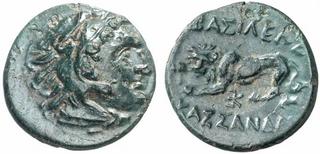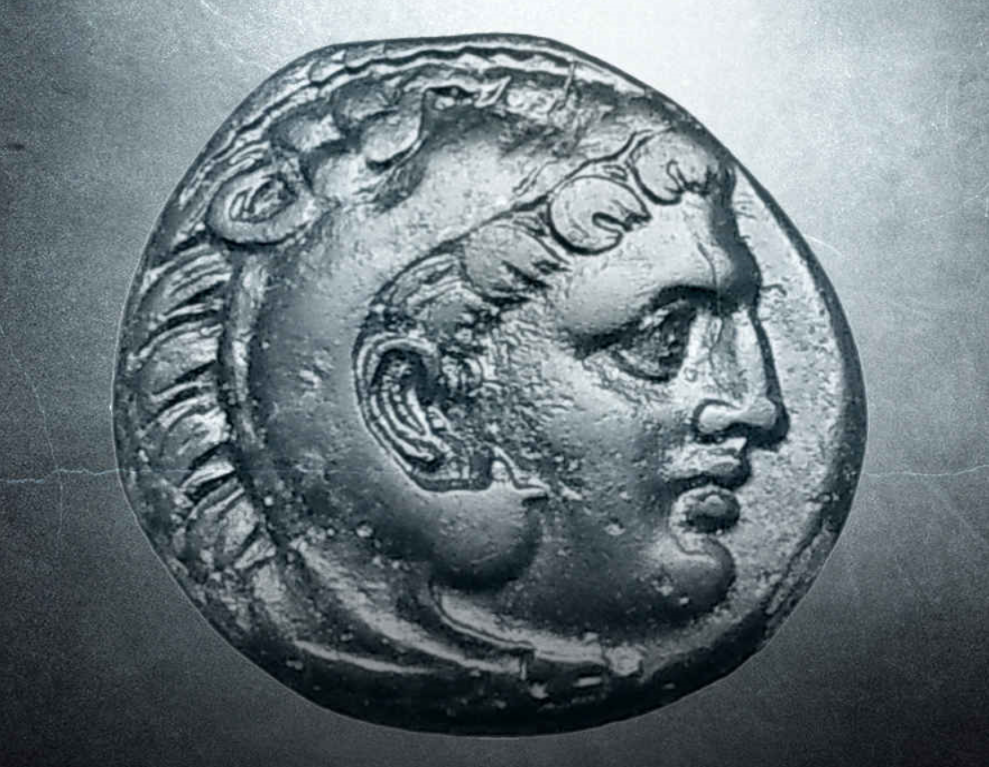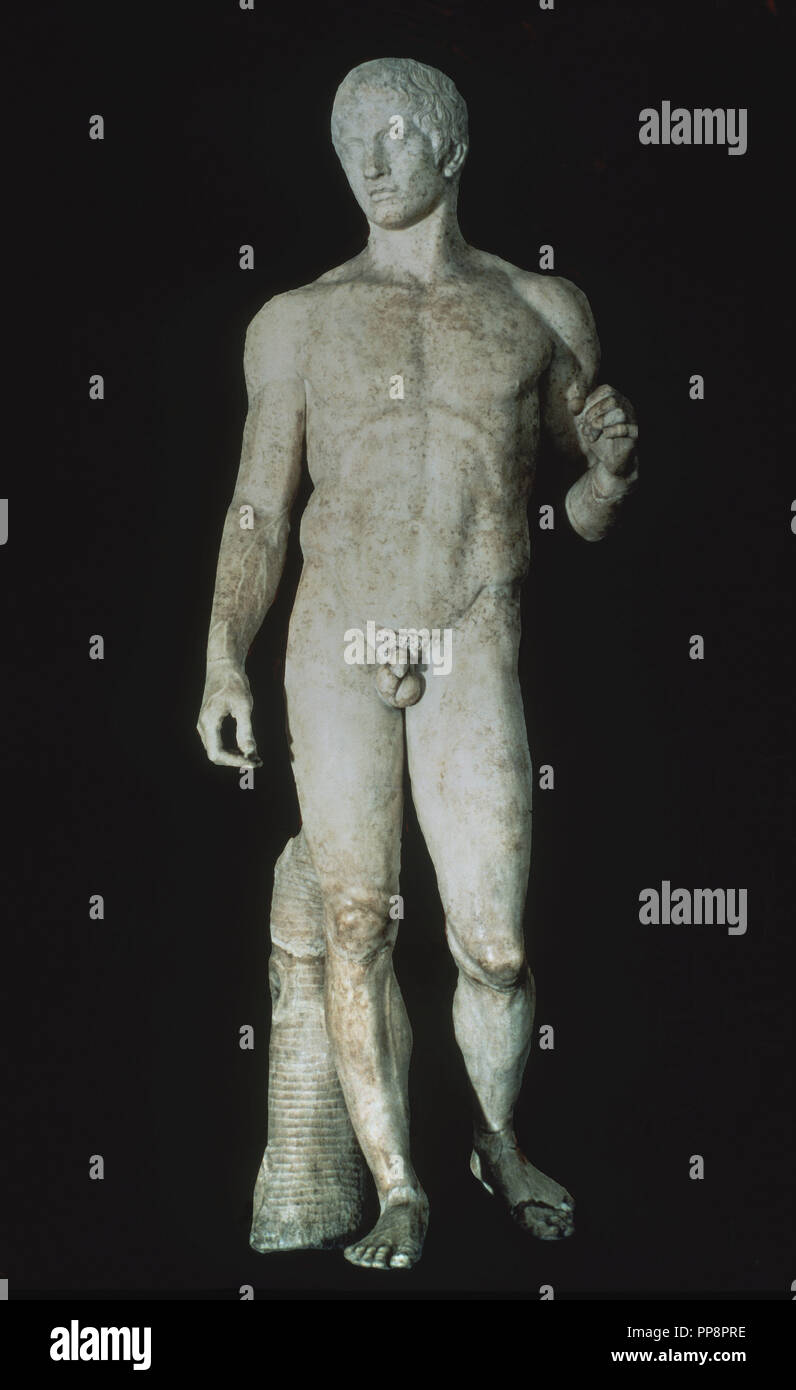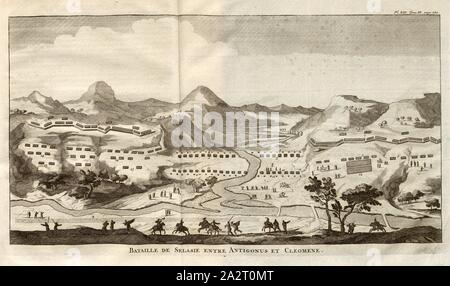Cassander: A Key Figure in the Hellenistic World
Introduction
Cassander, a prominent Greek general and politician, played a significant role in the tumultuous period following the death of Alexander the Great. Born in 350 BC, he grew to become one of the most influential figures of the Hellenistic era, known for his strategic military leadership and political acumen. Cassander's life was marked by a series of alliances, conflicts, and strategic marriages that allowed him to maintain power and influence in a period of great upheaval and change in the Mediterranean world.
Early Life and Rise to Power
Cassander came from a notable family, being born in Idumene, a small city-state in the region of Chalcidice. His father, Agathocles, was the ruler of this area, and Cassander received a classical education. His education, which included training in military tactics and political strategy, helped shape his future as a powerful leader. Cassander's rise to prominence, however, did not happen without a significant event that altered the course of his life.
The Aftermath of Alexander's Death
Following Alexander's death in 323 BC, there was a massive power vacuum in the Hellenistic world. The succession crisis led to the Diadochi Wars, a series of conflicts between the generals and noble clans vying for control of Alexander's empire. Cassander was among the many contenders, and his strategic decisions would be pivotal in determining his ultimate success.
Strategic Marriages and Alliances
One of Cassander's most significant strategic plays was his marriage to Thessalia, the niece of Antipater, another key Diadochi general. This marriage not only strengthened his political position but also provided him with a valuable ally in the ongoing power struggles. Thessalia's influence and connections were instrumental in shaping Cassander's future plans, and their relationship became a cornerstone of his power base.
Conquering Macedonia
With his political and marital alliances
Okay, the user wants me to continue the article about Cassander, specifically the second part which should be around 1200 words. Let me check the previous response to make sure not to repeat the H1. The first part ended with "Conquering Macedonia," so I need to pick up where that left off.
The user mentioned starting without repeating H1, so the next section should be an H2. The previous H2 was "Conquering Macedonia," so maybe the next one could be about his military campaigns in Greece or his role in the Battle of Crœsus. Wait, the first part ended with Cassander's conquest of Macedonia, so the next logical step would be his campaigns moving into Greece, perhaps leading to the Battle of Crœsus. That makes sense as the next significant event in his career.
I need to ensure that the second part flows naturally from the first. The user wants the article to be 3600 words total, so each part is about 1200. I should outline key events: after conquering Macedonia, Cassander's actions in Greece, opposition from other generals, the role of Roxanne, the death of Alexander IV, and the rise of Antipater and Antigonus. Then, the Battle of Crœsus as a turning point, followed by his consolidation of power, establishing a capital, marriages to solidify alliances, and the political climate of the time.
I also need to make sure not to use markdown and stick to HTML tags like H2 and H3. Check for any repetition of information from the first part. The user probably wants a detailed, structured continuation that builds on previous content, covering Cassander's military strategies, political moves, and the challenges he faced. Including his interactions with other Diadochi generals and the impact of the war on the region would add depth. Also, mentioning the cultural and administrative changes he implemented in his territories could be important for the article's completeness.
Conquering Macedonia and Consolidating Power
In his quest to carve out a realm within Alexander the Great’s fractured empire, Cassander’s campaign to seize control of Macedonia marked a pivotal moment in his rise to prominence. Following the death of Alexander’s father, Philip II, the region had been a battleground for rival factions, leaving it politically unstable and ripe for exploitation. Cassander, with the support of Antipater—the regent of Macedonia and one of Alexander’s most trusted generals—launched a campaign to secure control over the northern territories. However, Antipater’s death in 319 BC created a vacuum that Cassander quickly sought to fill. By aligning himself with Antipater’s son, Alexander IV (a young, ineffective heir to the Macedonian throne), Cassander positioned himself as the new power broker in the region.
Despite his association with Alexander IV, Cassander faced significant resistance from rival claimants to the Macedonian throne, including the ambitious and charismatic general Polyperchon. Polyperchon had been a loyal supporter of Antipater and controlled a portion of the Macedonian army, which he used to challenge Cassander’s authority. The conflict between the two men escalated into open warfare, with Cassander using his growing network of allies and mercenaries to undermine Polyperchon’s hold. By 317 BC, Cassander had defeated Polyperchon and gained control of the key Macedonian city of Aegae, effectively consolidating power over the northern regions of the empire.
This victory was not merely a military triumph but a strategic masterstroke. By securing Macedonia, Cassander expanded his territory and strengthened his influence over the broader Hellenistic world. His control of the region allowed him to establish a stronghold from which he could project power further south into Greece. His political acumen was evident in his decision to present himself not as a usurper but as a liberator, arguing that the chaos following Alexander’s death had left Macedon in disarray and that his rule would restore order and stability. This narrative helped him gain the support of the Macedonian aristocracy, who saw in Cassander a leader capable of managing the region’s complexities.
However, Cassander’s ambitions extended far beyond Macedonia. The broader Hellenistic world was embroiled in conflict among the Diadochi—a group of Alexander’s generals vying for control of his vast empire. Cassander’s interests aligned with those of his father-in-law, Antipater, who was a key player in the power struggle. But after Antipater’s death, the political landscape shifted dramatically, forcing Cassander to navigate a treacherous web of alliances and betrayals. One of his most controversial moves was his decision to eliminate Alexander IV, the young son of Alexander the Great, who was still a figurehead of the Macedonian throne. Though Cassander argued that the boy’s existence endangered his rule, the act marked a turning point in his career, solidifying his reputation as a ruthless and pragmatic leader.
Marriage Alliances and Political Machinations
Cassander’s ability to maintain his power relied heavily on his strategic use of marriage alliances. His first and most politically advantageous marriage was to Thessalia, the daughter of Antipater and a woman of considerable influence. Through this union, Cassander gained not only the backing of the powerful Antipater family but also a direct claim to the Macedonian throne. However, Cassander’s political landscape grew increasingly complicated when he began forming relationships with other key figures in the Hellenistic world.
One of the most significant of these unions was his marriage to the former queen of Egypt, Pharaoh’s sister Cleopatra of Macedon. This alliance was forged in response to the growing dominance of Ptolemy, the satrap of Egypt, who had established himself as a major power in the eastern Mediterranean. By marrying Cleopatra, Cassander sought to counterbalance Ptolemy’s influence and forge a stronger connection between Macedonia and Egypt, two regions with historical ties. The union was not without complications, however, as Cleopatra was still a powerful and influential figure in her own right, and her presence in Cassander’s court introduced new dynamics to his rule. Her influence was evident in the way she shaped his policies, particularly in matters involving diplomacy and military strategy.
In addition to his marriage to Cleopatra, Cassander also formed a strategic alliance with the powerful kingdom of Epirus, a region in modern-day Albania. The Epirote king, Aeacides, had long been a rival to Macedonia, and their relationship had been characterized by frequent conflicts. However, Cassander understood that Epirus held significant military strength and resources that could be leveraged to his advantage. To secure this alliance, he arranged for his eldest daughter, Phila, to marry Aeacides’ son, Alexander. This union not only secured a strategic partnership with Epirus but also granted Cassander a claim to the Epirote throne through his daughter, further extending his influence in the region.
The Battle of Crœsus and the Struggle for Supremacy
Cassander’s string of military and political victories did not go unchallenged. Among his most formidable adversaries was Antigonus I Monophthalmus, a general who had carved out a vast empire in the eastern Mediterranean and was increasingly seen as a threat to Cassander’s ambitions. Antigonus, with his powerful armies and extensive control over regions like Syria and Phrygia, posed a significant challenge to Cassander’s growing influence. The tension between the two men escalated into open conflict, culminating in the Battle of Crœsus in 317 BC.
The battle, named after the river Crœsus, was a crucial turning point in the Hellenistic wars. Antigonus, seeking to assert his dominance over the western Mediterranean, led his forces against Cassander’s armies, which were bolstered by his allies from Epirus and the Macedonian elite. The fighting was intense, with both sides deploying large numbers of troops and an array of siege engines and cavalry. Cassander’s forces, however, managed to achieve a decisive victory, forcing Antigonus into a humiliating retreat. This defeat weakened Antigonus’s position in the region and allowed Cassander to consolidate his power more effectively.
The aftermath of the Battle of Crœsus had far-reaching consequences. It marked the first major defeat of Antigonus in the Diadochi Wars and effectively limited his ability to expand his influence westward. For Cassander, the victory reinforced his status as a military and political leader of considerable stature. It also solidified his control over Macedonia, as his enemies in the region saw his success as a harbinger of his dominance. The battle also had implications for the broader Hellenistic world, as it demonstrated that the power struggles among the Diadochi could be resolved through military means, setting the stage for further conflicts and alliances in the years to come.
Establishing a Capital and Administering a Kingdom
With his military successes and the collapse of his rivals, Cassander began the process of establishing his own capital and administrative system. Unlike the chaotic and often transient nature of the Diadochi conflicts, Cassander sought to create a stable and centralized government that would rival the empires of the past. He chose the city of Thessalonica as his new capital, a strategic choice that reflected his ambitions to control both the northern and central regions of the Hellenistic world. Thessalonica, originally founded by the Greek general Cassander himself, was a natural hub for trade and administration, and its location provided him with access to both the Aegean Sea and the interior of the Balkan Peninsula.
Cassander’s vision for his kingdom extended beyond mere territorial control. He implemented policies aimed at stabilizing the region, including the redistribution of land to the Macedonian aristocracy and the establishment of a system of local governance. His reforms were designed to integrate the former Macedonian provinces into a cohesive administrative unit, ensuring that he had a reliable network of officials and military commanders to manage his burgeoning realm. This approach not only consolidated his power but also provided him with a stable base from which to project influence further into Greece and the Aegean.
One of the most striking aspects of Cassander’s reign was his willingness to use diplomacy and military force in tandem. While he was a formidable general, he understood the limitations of brute force in maintaining long-term control. As a result, he sought to create a legacy that would endure beyond his lifetime by instituting policies that promoted economic growth and cultural development. His efforts to integrate the Hellenistic world into a more unified sphere laid the groundwork for future rulers, including the Ptolemies in Egypt and the mighty Seleucids in the east.
Cassander in the Broader Hellenistic Struggle
Cassander’s actions did not occur in isolation. His rise and fall were deeply intertwined with the broader power struggles of the Hellenistic world, where the remnants of Alexander’s empire were constantly in flux. The Diadochi Wars, which spanned nearly half a century, saw the rise and fall of numerous generals who vied for control of Alexander’s vast dominion. Cassander was just one of many players in this intricate game, but his strategies and military prowess set him apart from his contemporaries.
As the conflicts among the Diadochi continued, the region of Greece became a focal point for power struggles. The relatively autonomous city-states of the region, once loyal to Macedonian rule, now found themselves caught between competing factions. Cassander, ever the pragmatist, sought to maintain control over these city-states while positioning himself as a protector of Hellenic culture and tradition. This dual approach allowed him to secure the loyalty of key Greek leaders, who saw in him a leader who could restore order to a region that had been devastated by years of war.
At the same time, Cassander’s interactions with other Hellenistic rulers, such as the Ptolemies and the Seleucids, reflected the shifting balance of power in the Mediterranean. While he initially sought to form an alliance with Ptolemy, the Egyptian satrap, their relationship was fraught with jealousy and mistrust. Ptolemy, who had once been a close ally of Alexander the Great, viewed Cassander’s growing power with suspicion and sought to undermine him whenever possible. This rivalry would eventually lead to a conflict that reshaped the Hellenistic landscape and left a lasting impact on the region.
Cassander’s legacy, however, is not solely defined by conflict. His ability to navigate the treacherous waters of Hellenistic politics, forge strategic alliances, and implement policies that stabilized his realm marked him as one of the most significant figures of the post-Alexander era. Although his reign was marked by violence and betrayal, he was ultimately relentless in his pursuit of power and influence. His actions not only shaped the political map of the ancient world but also left an indelible mark on the Hellenistic civilization that followed.
Cassander’s Legacy and Death
In the twilight of his reign, Cassander’s influence spanned much of the ancient Hellenistic world. His legacy was shaped not only by his military prowess but also by his diplomatic acumen and his efforts to integrate the diverse regions under his control. Yet, despite his many accomplishments, Cassander’s later years were marked by personal tragedy and political intrigue.
Among Cassander’s most notable achievements during this period was the establishment of Thessalonica as a vibrant and thriving center of commerce and culture. The city, located strategically between the Aegean Sea and the Macedonian hinterlands, rapidly became a bustling metropolis and a symbol of Cassander’s successful governance. Its port facilitated trade routes, connecting the region to distant corners of the known world, and the city itself became a cultural haven for thinkers, artists, and philosophers from across the Mediterranean.
However, Cassander’s personal life was a source of both pride and sorrow. In 308 BC, he married Roxana, the daughter of Bessus, a Bactrian satrap whose rebellion against Alexander IV had been crushed by Antigonus I Monophthalmus. Roxana’s dowry consisted of vast riches and an important lineage, aligning Cassander with Bactria’s rich resources and strengthening his claim to rule over a vast territory stretching into Central Asia. Roxana’s marriage also served as a clever political move, as it united Cassander with a significant power bloc in the eastern regions of Alexander’s empire.
Yet, Cassander’s relationship with Roxana was marred by tragedy. Roxana became pregnant but died giving birth to a boy they named Alexander in 307 BC. Cassander, deeply grieved by her loss and concerned about his political future, sought to secure his legacy by eliminating any potential challengers to the boy’s claims to the throne. In a chilling act, Cassander instructed Roxana’s physician to murder the infant Alexander immediately after birth, fearing that the young prince might grow up to pose a serious threat to his rule. This dark chapter in Cassander’s history exemplifies the ruthlessness required by the times, despite his reputation as a skilled and strategic leader.
Cassander’s political landscape continued to evolve as he aged, and his later years saw him faced with new threats and challenges. The death of Antigonus I Monophthalmus in 301 BC led to a power vacuum that Cassander hoped to exploit. With the ascension of Antigonus II Gonatas, Cassander’s political maneuvers became even more critical. The Ptolemaic kingdom under Ptolemy II Philadelphus grew increasingly wary of Cassander’s ambitions and worked tirelessly to undermine his position in the eastern Mediterranean.
The culmination of these tensions came at the Battle of Ipsus in 301 BC. In this decisive engagement, Cassander allied with several other Hellenistic kings, including Seleucus I Nicator, to confront the combined forces of Lysimachus and Antigonus II Gonatas. Though Cassander’s forces emerged victorious, the cost was high, and his losses undermined his ability to exert control over the vast region. This setback marked a turning point in Cassander’s reign and signaled a decline in his fortunes.
In his final years, Cassander focused on maintaining his authority over his domains and securing a smooth transition of power. He appointed his son Antipater as regent, ensuring that his chosen successor would inherit a stable and unified kingdom. Cassander passed away on July 6, 297 BC, in Thessalonica, having lived a life defined by military conquest, political intrigue, and the relentless pursuit of power.
Antipater, tasked with governing what remained of Cassander’s domains, presided over a period of relative calm. However, the political instability that had plagued Cassander’s reign persisted, and within a few decades, the region would face new challenges and upheaval. Cassander’s son, Antipater, struggled to maintain unity and ultimately failed to pass on the legacy of his father’s rule. Nonetheless, Cassander remains a towering figure in Hellenistic history, remembered for his strategic genius and relentless ambition.
The End
















Comments